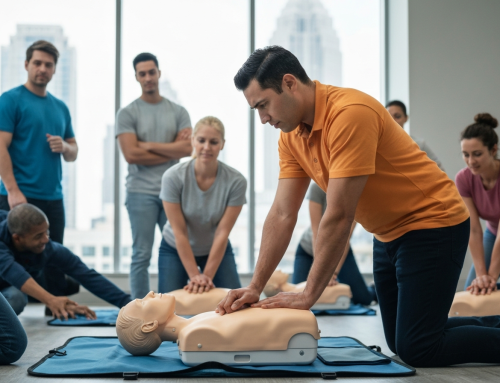The Importance of Bystanders in CPR Emergencies
In instances of arrest, time is a factor in determining a person’s survival chances. The actions of bystanders during these moments can make a life-saving difference. Having the knowledge and skills to respond effectively in a CPR emergency is not just valuable; it can potentially save lives.
Time Sensitivity in Cardiac Arrest
Cardiac arrest occurs when the heart stops beating, slowing blood flow to organs like the brain. Without intervention, this could result in death within minutes. Statistics from the American Heart Association reveal that with each passing minute without CPR and defibrillation, the likelihood of survival decreases by 7 10%. Immediate action can significantly improve an individual’s chances of surviving.
The Vital Role of Bystanders
Often, bystanders are present at the scene before professional medical help arrives during emergencies. Those who are trained in CPR can initiate life-saving measures immediately, ensuring blood circulation to organs until help arrives. Even a brief period of chest compressions can impact the overall outcome.
Addressing Fear as an Obstacle
Fear stands out as an obstacle preventing bystanders from administering CPR. The fear of making mistakes, causing harm, or dealing with consequences can hold people back from taking action. Nevertheless, it’s crucial to recognize that taking some form of action is usually better than doing nothing. Various regions have ” Samaritan” laws in place to shield bystanders who offer emergency assistance from trouble as long as they act with good intentions.
The Importance of Training
CPR training is widely accessible and typically takes only an hour to complete. Numerous organizations, such as the Red Cross and local hospitals, provide courses covering CPR and hands-on CPR, proving effective during cardiac arrest. Hands CPR involves performing chest compressions without giving mouth-to-mouth breaths, making it simpler and less daunting for individuals.
The Influence of Skilled Bystanders
Data reveals that communities with residents trained in CPR exhibit higher survival rates for cardiac arrests that occur outside medical facilities. By acquiring knowledge in CPR, you do not equip yourself with a life-saving skill. Also, it contributes to fostering a safer and more prepared community.
In summary, the significance of bystanders being proficient in CPR cannot be emphasized enough. When an emergency arises, the ability to save a life rests in the hands of those who are trained.
By educating and raising awareness, we can ensure that more individuals are prepared to step in during situations and offer assistance to those who require it.
If you haven’t done so yet think about enrolling in a CPR course – it’s a commitment of time that could have an impact.
Sources;
American Heart Association; CPR Facts & Statistics https://cpr.heart.
Samaritan Laws https://www.ncbi.nlm.nih.
Our Schedule: https://cprworksofcharlotte.enrollware.com/schedule
- Charlotte
- Rock Hill
- Gastonia
- Concord
- Cornelius
- Monroe
- Harrisburg
- Matthews
- Mint Hill
- Fort Mill
- Indian Land
- Kannapolis
- Belmont
- Wilmington
- Jacksonville
- Shallotte
- Carolina Beach
- Surf City
- Hampstead
- Sneads Ferry
- Leland
- Southport
- Greensboro
- High Point
- Hickory
- Columbia
- Florence
- Myrtle Beach
- North Myrtle Beach
- Surfside Beach
- Myrrells Inlet
- Conway
- Ocean Isle Beach






Leave A Comment